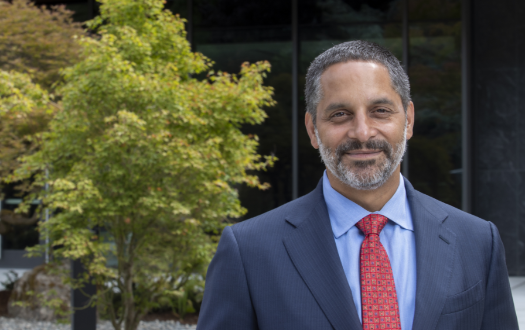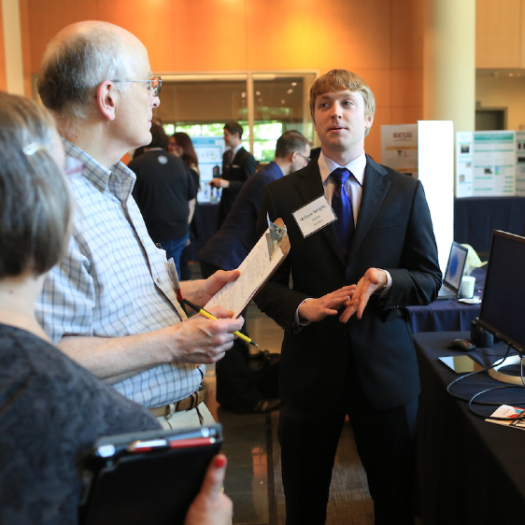 On July 1, President Eduardo Penalver began his tenure in Seattle University’s most highly visible all-encompassing post with some tremendously large shoes to fill left by President Emeritus Stephen Sundborg, S.J. But that’s not the only challenge he faces coming on board. As the first lay president in Seattle U’s 130-year history, Penalver must bring Ignatian pedagogy and spirituality to his work in ways different from his predecessors. Viewing an abundance of opportunity as embellishing the challenges he will face, Penalver firmly embraces his position.
On July 1, President Eduardo Penalver began his tenure in Seattle University’s most highly visible all-encompassing post with some tremendously large shoes to fill left by President Emeritus Stephen Sundborg, S.J. But that’s not the only challenge he faces coming on board. As the first lay president in Seattle U’s 130-year history, Penalver must bring Ignatian pedagogy and spirituality to his work in ways different from his predecessors. Viewing an abundance of opportunity as embellishing the challenges he will face, Penalver firmly embraces his position.
In the years ahead, he envisions growing Seattle U’s student population and increasing the number and reach of our programs through greater access to education, while also building Seattle U’s reputation through nationwide recruiting and elevated awareness of the opportunities available to students in our unique location. You, our alumni, will play a vital in role making President Penalver’s vision a reality.
Earlier this month the SU Voice sat down with President Penalver—Eduardo, as is his preference—to chat about his first two months as president, his priorities and his thoughts on the value that alumni bring to a university.
VOICE: It’s great to meet you, Eduardo. You’ve no doubt had a busy last couple of months! Can you share a bit with us about your experience since you became president on July 1st?
EDUARDO: As they say, it’s been like drinking out of a firehose! I’ve been trying to go full speed since day one, meeting as many different people as I can and trying to listen, learn and understand where I can have the greatest impact. I’ve been overwhelmed by the welcome I’ve received, the outpouring of invitations from trustees, community partners, local business leaders and people who care about Seattle University and are invested in its success. The breadth and diversity of that outreach has been remarkable. It’s probably been like air traffic control work for Anne Moran, ’87, my Senior Assistant, keeping everything moving and getting things scheduled.
VOICE: How do you feel about making history as Seattle University’s first lay president?
EDUARDO: Certainly, it’s a daunting challenge, and not just because I’m not a priest. It’s always challenging to follow someone like Fr. Steve who was so successful for so long, and at a very high level. I’ve heard that, for many people, he is the embodiment of the university.
Fr. Steve told me he knew he was likely to be the last Jesuit president at Seattle U and had been laying the groundwork for the transition to lay leadership since he arrived. He’s been very generous with me, providing advice and making introductions to help this transition go as smoothly as possible.
VOICE: Did you have any trepidations?
EDUARDO: I had trepidation when I was initially contacted about the search, but everyone I’ve talked to has been very supportive of this transition and offered their help in ensuring we remain faithful to and respectful of the university’s Jesuit and Catholic identity.
The Jesuits have a depth of understanding and familiarity with the Ignatian pedagogy and spirituality that I can’t replicate in the same way. As much as I admire it, I have to find other ways to honor that tradition in my work. Going about that requires a degree of thoughtfulness, and I’ll have to lean on other people to help me ensure that Ignatian pedagogy and spirituality remain at the center of who we are, and are available to our students, faculty and staff.
But every challenge is an opportunity. And so I also see this transition to lay leadership as an opportunity to think about how we’re living out our Jesuit identity at Seattle University and how we could do it better, how we might structure things differently to enhance the way we live out that identity. We know the students are changing and the society around us is changing. We need to find new ways to engage people who are skeptical of organized religion and of the Catholic church in particular.
VOICE: Where will you focus your efforts in the first few years?
EDUARDO: A big part of my attention this year will be on continuing to listen and learn to really know this community. I’ll also be working to form relationships with people inside and outside Seattle U, looking for areas of convergent interests between the university and the broader community. If I can do that effectively, a lot of good will come from it. Looking for new resources will also be a big part of my job not just in the first few years, but indefinitely.
VOICE: I assume some of those relationships you’ll be working to build are with the business community. Will our alumni have a role in that effort?
EDUARDO: Yes, with the business community. Seattle U is fortunate to be located in the most dynamic metropolitan region of the country. We’re surrounded by iconic traditional Northwest companies like Boeing, Costco, Weyerhaeuser, Microsoft, Alaska Airlines and Starbucks, and more recent arrivals like Amazon, Zillow and Expedia. We have alumni at very high levels in the business community, and it’s important that we continue to actively engage our alumni to help us achieve our goals. Schools are only as strong as their alumni are loyal and engaged. That strong alumni network is instrumental in building relationships off campus, as well as in attracting students. Often, the first interaction a prospective student has with a school is through an alum who shares their student experience with the prospect.
For the business community, there’s real reciprocal value in fostering a strong relationship with Seattle University. I’ve heard from local employers who are having trouble attracting talent from outside the region to Seattle because of competition for those people, as well as the cost of living here. Seattle University can help recruit students to this region. Once here, alumni can help open doors for student internships, projects and employment opportunities. In this way, Seattle U can help local businesses to find qualified employees even as those businesses help Seattle U recruit a strong and diverse student body.
VOICE: What are some other ways you would like to see our alumni engage with the
university?
EDUARDO: Seattle U is doing great work with our alumni in a multi-stranded approach that we want to continue. We need alumni to mentor and sponsor students, and to come back and talk with students about their career paths and experiences. We need alumni to serve as adjunct faculty, to help us with student recruiting and to interview student applicants. We need volunteers to organize the alumni community and to host events. We need alumni to attend university events and to contribute to the Annual Fund. And we need alumni to hire our graduates. There are many opportunities for alumni to engage with Seattle U.
VOICE: How do you, personally, plan to be involved with our alumni?
EDUARDO: I will be meeting with groups like the Alumni Board of Governors and the Board of Regents, and any time I travel I’ll try to meet with groups of alumni wherever I am. I’ll also do some alumni-specific travel around the state and the region.
I look forward to engaging with University Advancement across any number of initiatives to bolster our connection with alumni.
Alumni giving is an important part of a university’s success for sure. But people tend to give not just because they have a sense of gratitude to the university, but because the university has continued to be a part of their lives. We need to keep investing in efforts to connect people back, to make Seattle University relevant to them and to get them involved in the lives of our students, in the life of the university.
VOICE: In closing, what message would you like to send to Seattle University alumni?
EDUARDO: Stay involved. Once you graduate, you become an even more important part of this community. Seattle University is not a place where you spend a few years getting your degree and then move on. We need you to continue to participate in so many different ways, to enrich the lives of our students and to help us sustain the university’s mission, which is such an important one. We can’t do it alone.

 Joe Blaschka Jr., ’73, has been making a difference for Seattle U students since shortly after graduating with his electrical engineering degree. He’s been a passionate volunteer for 10+ years and made his first gift—$10 to the SU Fund—in 1978. Scholarships and guidance from faculty mentors helped Joe get through school while juggling two jobs and a family. Now, as both a donor and volunteer he ensures today’s students can access the same resources and personalized guidance. Working with the Project Center, providing mentorship and resume assistance to College of Science & Engineering students, and serving on the Dean’s Leadership Council and Electrical & Computer Engineering Advisory Board, Joe helps students build confidence and skills for their futures, while also enjoying their innovative perspectives and the way they keep his industry knowledge up to date.
Joe Blaschka Jr., ’73, has been making a difference for Seattle U students since shortly after graduating with his electrical engineering degree. He’s been a passionate volunteer for 10+ years and made his first gift—$10 to the SU Fund—in 1978. Scholarships and guidance from faculty mentors helped Joe get through school while juggling two jobs and a family. Now, as both a donor and volunteer he ensures today’s students can access the same resources and personalized guidance. Working with the Project Center, providing mentorship and resume assistance to College of Science & Engineering students, and serving on the Dean’s Leadership Council and Electrical & Computer Engineering Advisory Board, Joe helps students build confidence and skills for their futures, while also enjoying their innovative perspectives and the way they keep his industry knowledge up to date.